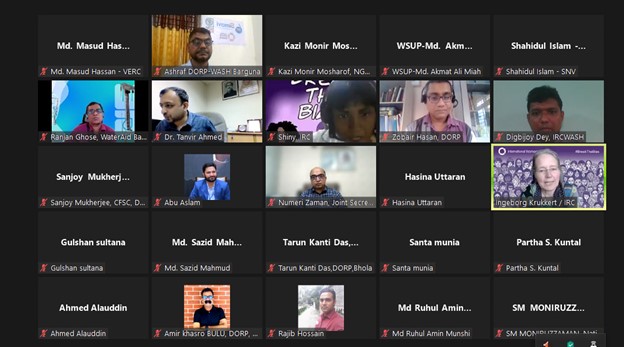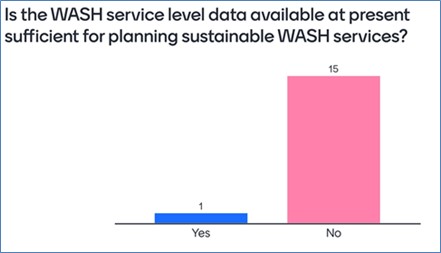Published on: 17/03/2022

Photo caption: participants of the building block assessment virtual meeting.
This news item was written by Digbijoy Dey, Shiny Saha (IRC) and Mohammad Zobair Hasan (DORP).
Between December 2021 and February 2022, IRC in collaboration with DORP (Bangladesh) carried out a Building Block Assessment of WASH Service Delivery models in three coastal towns - Bhola, Barguna and Ramgati. The assessment included desk review as well as collection of primary data from the 3 towns (two district towns - Bhola and Barguna - and one sub-district town - Ramgati).
On 8th March 2022, IRC in collaboration with DORP organized a virtual discussion to share and validate the findings from the assessment. The meeting was attended by representatives of civil society, academia and the government. Dr. Tanvir Ahmed, Director of ITN-BUET (a leading research centre on WASH in Bangladesh) joined as the key discussant for the session. Mr. Numeri Zaman, the Joint Secretary, Local Government Division (LGD) of the Peoples Republic of Bangladesh, joined as the Chief Guest.
The discussion comprised of four parts: sharing highlights from the assessment (including the methodology, individual building block scores and key findings), followed by open discussion by the participants to deliberate on the findings, discussion by chief discussant, and concluding remarks by the Chief Guest.
The participants validated the findings and highlighted the need to focus on finance for improved WASH services. The need for finance was raised also to address the capacity gaps that exist in service delivery. This also brought to fore the need to revise the existing tariff collection system - to move beyond charging for operational costs to capital maintenance costs as well – to ensure financial sustainability of the services.
The need for regular operation & maintenance of infrastructure was highlighted for sustainability of WASH services. Further, the participants also highlighted the lack of data for monitoring and planning. This was confirmed in a round of mentimeter questions as well (as shown below).

The lack of ownership of hygiene was agreed by the participants, who raised the need for institutional changes to address the same. The discussion also touched upon the challenges of designing projects to address immediate needs over long-term sustainability.
Dr. Tanvir Ahmed, Director of ITN-BUET, remarked on the relevance of the study, in line with the shift in focus from infrastructure to service delivery. The Joint Secretary, Mr. Numeri Zaman, responded to the findings by sharing the ongoing and planned initiatives of the Government. Notable amongst them was the development of an ‘Operation & Maintenance Guideline’ for WASH infrastructure. He also mentioned the need to institute a regulatory authority to support private sector for WASH service delivery in Bangladesh. Given the important role played by private entrepreneurs in WASH service delivery, he noted, the need for such an authority is vital.